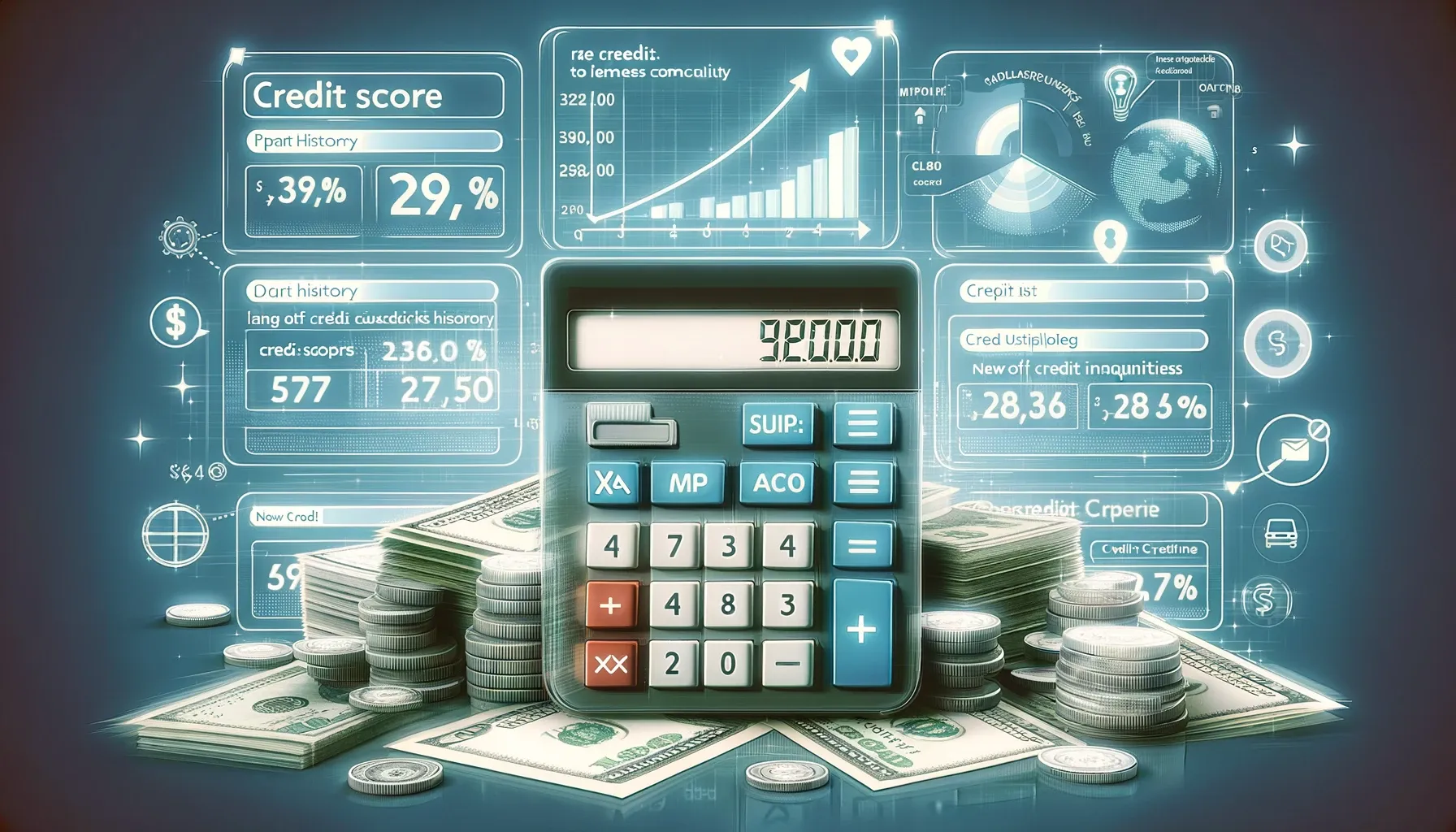Boost Your Credit Score in 30 Days: Action Plan for Days 1-7
 Did you know some people have raised their credit scores by 100 points in only 30 days? It's true! Improving your credit rating in a short amount of time is possible, and it can make a significant impact on your financial standing.
Did you know some people have raised their credit scores by 100 points in only 30 days? It's true! Improving your credit rating in a short amount of time is possible, and it can make a significant impact on your financial standing.
Plus, most credit scores are updated every 30 days, meaning changes you make now can immediately affect your score. So, if you want to elevate your credit score fast, you're in the right place.
This 30-day plan provides detailed, daily action steps to evaluate your credit history and enhance your credit rating in 30 days.
Let's get started on this quick credit score improvement plan!
Day 1: Obtain and Review Your Credit Report
Obtain Your Credit Report
A lot of people don't know they can get their credit reports for free. If they do know, they don't know how. So, I'm going to show you three ways you can do it today.
To improve your credit score in 30 days, obtain a free copy of your credit report from the three major credit bureaus: Equifax, Experian, and TransUnion on the first day. The following days build on this step. So, let's get to it.
Follow these steps right now to obtain your free credit report from the three major credit bureaus to check your credit report for free. You can do this once a year for free through AnnualCreditReport.com.
Here are three ways to get your credit reports for free:
1) Online: Go to AnnualCreditReport.com.
2) Phone: Call 877 FACTACT (877-322-8228).
3) Mail: Fill out the Request Form and mail it to:
Annual Credit Report Request Service
P.O. Box 105281
Atlanta, GA 30348-5281
- To download the form, you need an Adobe Viewer. Get the free viewer by clicking here. (If you already have Adobe Viewer, skip this step and download the request form.)
- Download the Request Form.
Review Your Credit Report
Review each report for errors or discrepancies that might be lowering your score. This step is essential as it allows you to understand your current credit standing and identify areas for improvement.
If you find any inaccuracies in your report, record them. On Day 2 you will dispute them with the respective credit bureaus. Cleaning up your credit report by removing any erroneous negative information can potentially boost your score quickly.
Common Mistakes & How to Fix Them
Review your credit report carefully for any of the errors or inaccuracies in the chart above. Record them for Day 2's action plan.
Day 2: Dispute Credit Report Errors to Boost Your Credit Score in 30 Days
Next you will learn how to dispute errors and inaccuracies you found on Day 1. You will dispute each with the credit bureau reporting the questioned information with the intention of having the errors and discrepancies either removed or corrected.
To initiate the dispute resolution process, follow these steps:
- Identify the errors or discrepancies on your credit report.
- Contact the credit bureaus: Equifax, Experian, and TransUnion.
- Provide detailed documentation and evidence to support your claim.
- Request that the inaccuracies be corrected or removed from your report.
Disputing credit report errors, credit report inaccuracies, and credit bureau discrepancies can rectify incorrect, negative information that may be dragging down your credit score.
Credit Bureau Contact Information
- Website: Equifax
- Website: https://www.equifax.com/personal/credit-report-services/free-credit-reports
- Phone: 866-349-5191
- Website: Experian
- Website: https://www.experian.com/disputes/main.html
- Phone: 888-397-3742
- Website: TransUnion
- Website: https://www.transunion.com/credit-disputes/dispute-your-credit
- Phone: 800-916-8800
Day 3: Set Up Bill Payment Reminders
Missing even a single payment can have a devastating effect on your creditworthiness. To help you stay on top of your bill payments, I recommend that you set up payment reminders.
You can set up payment reminders in various ways, such as through your online banking platform, mobile apps, or calendar alerts. Just find what works for you and do that.
Commit now to stop paying late fees! Never miss another loan or credit card payment. How? Set up payment reminders.
- Paying My Bills by Mail: If I plan to mail my payment, I set a reminder 10-12 days before the due date, so that I have time to write out the bill, put it in an envelope, find a stamp, and get it to the post office seven or eight days before the bill is due.
- Paying My Bills Online: If I plan to pay my bills online, I set a reminder two or three days before the due date to ensure I have time to log into my account, schedule the payment, and verify that it has been processed successfully. Planning to pay my bills this way allows time for potential delays in processing or technical issues that may arise.
- Paying My Bills by Autopay: Even if my bills are on autopay, I monitor them to ensure they get paid, because at least once a year, a technical glitch beyond my control happens (an automatic payment fails - banks aren't perfect). But because I'm paying attention I catch it before a late fee can occur.
As you know, timely payments are crucial for a good credit score, and reminders can help you stay on track.
Benefits of setting up payment reminders:
1. Financial punctuality: Payment reminders help you stay on top of your bills and pay them on time every time. Staying on top of your bills gives you peace of mind.
2. Bill payment habits: By setting payment reminders, you can establish a habit of timely bill payments, which positively impacts your credit score over time.
3. Avoid late fees: Timely payments prevent unnecessary late fees and penalties that can accumulate on missed or late payments.
Day 4: Pay Your Bills on Time, Every Time
Building on Day 3's payment reminders, it's important to make it a habit to pay all your bills on time, every time. But one thing I learned the hard way... the bill is not paid until it has been processed.
So, it's not enough just to pay your bill. You must make sure the creditor credits your account on time and with the correct amount. Why? Because, again, the bill is not paid until it has been processed.
Whether I pay by mail, online, or through autopay, I consistently monitor my bank account until I verify that the payment has been processed successfully. Additionally, I double-check the account I paid to confirm that everything appears accurate.
After you set up your reminders (which should only take a few minutes), you'll receive notifications and reminders before your payment due dates. At that point, you'll need to stop and make the payment so that you don't pay late and incur a fee, or worse, forget and miss the payment.
Do not skip this step. If necessary, set another reminder to check that it has been properly withdrawn from your account bank and processed on time. (See Day 3: Set Up Payment Reminders.)
As mentioned on Day 3, banks aren't perfect. Occasionally their technology fails or someone lets something slip through the cracks. So, it's important to make it a habit to pay all your bills on time every time. But following up after you send your payment to ensure it gets processed is the only way to pay them on time every time.
Late payments can significantly harm your credit score as you already know. While I was researching to write this article the Federal government in the United States was trying to lower late fees, because, like most people, the government believes late fees are too expensive. I'm not sure whether they will successfully introduce legislation to lower late fees, but since I plan (and recommend) avoiding late fees, the fee amount a financial institution charges for late payments is irrelevant as long as you pay your bills on time.
Here's how to reinforce the good habit of punctual payments:
- Calendar: Set aside specific times during each month to review and pay your bills promptly.
- Automatic Payments: Consider automatic bill pay options; either use the creditor's autopay feature or set up automatic recurring payments through your banking app or bank's website.
- Timely Withdrawals: Check your bank account until you verify the money has been withdrawn properly.
- Properly Processed: Check your account with the creditor to confirm that the payment has been properly processed and applied to your account.
By reinforcing the habit of punctual payments, you'll gradually see improvements in your credit score.
Day 5: Reduce Your Debt-to-Credit Ratio
Your credit utilization ratio plays a crucial role in determining your credit score. It measures the amount of credit you're currently using compared to your total available credit limit.
In other words, if you have a $6,000 balance on your $10,000 credit card, you have a 60% ratio.
Keeping a low credit utilization ratio can positively impact your credit score. Lowering your debt-to-credit ratio is important to improve your score quickly.
Here are two simples steps you can take to lower your credit utilization ratio:
- Pay Down Existing Balances: Start by paying off as much of your outstanding debt as possible. This will help decrease the amount of credit you're using.
- Avoid New Debt: Minimize new debt by refraining from taking on additional credit card balances or loans. Focus on reducing your existing debt instead.
Aim to keep your credit utilization below 30% of your available credit limit. By actively managing your credit card use and lowering your utilization rate, you can see significant improvements in your credit score.
Your credit utilization ratio is calculated by dividing the total amount of credit you're currently using by the total amount of credit available to you.
Here's a visual representation of how your credit utilization ratio can affect your credit score:
To calculate it for a credit card:
- Add up the balances on all your credit cards.
- Add up the credit limits on all your credit cards.
- Divide the total balance by the total credit limit.
- Multiply the result by 100 to get the percentage.
By paying down your existing balances and avoiding new debt, you can lower your credit utilization ratio and improve your credit score. It's like giving your credit score a breath of fresh air!
Day 6: Pay Down Balances on Revolving Accounts
Now that you have taken five, big steps forward it's time to review your credit report and dispute any errors. Focus on reducing your balances on credit cards and any other revolving credit accounts.
- Revolving credit is an account that lets you borrow money, repay it, and then borrow it again.
- Revolving credit accounts typically have a set credit limit called an available balance or availability.
- Revolving credit's availability represents the maximum amount you can borrow at once.
Lowering your outstanding credit balances can positively impact your credit utilization ratio, which is an important factor in calculating your credit score.
First, identify accounts with the highest utilization rates and with the highest interest rates. These accounts have the most significant impact on your credit utilization ratio. You can make a more substantial impact on reducing your overall debt when you prioritize them first.
When making payments, aim to pay more than the minimum amount due whenever possible. This extra payment goes directly towards reducing the balance and can help you make progress quicker.
By lowering your credit card debt and effectively managing your credit card use, you will be taking control of your finances and boosting your overall financial health.
Look at the table above to see an example of how revolving accounts may be structured. Which one should you pay down first? Some say the card with the highest interest rate, some say the card with the highest balance, and others say the card with the lost balance.
Personally, I would pay off the card with the lowest balance first, regardless of the interest rate. Why? To free up cash sooner.
Regardless of which you choose first, it won't make much difference if you keep spending more than you pay down. By paying down the balances on these accounts, you can lower your credit utilization ratio and move closer to your goal of improving your credit score.
Keep in mind, lowering your balances not only improves your credit utilization ratio but also saves you money on interest payments each month and over the long term. It's a win-win situation for your credit score and your financial well-being.
Day 7: Make a Payment Plan for Outstanding Debts
As you reach the final day of this week's plan, let's tackle any outstanding debts by creating a strategic payment plan. Prioritizing high-interest debts is key, as reducing them can positively influence your credit score. By taking proactive steps to manage your debt, you're setting yourself on the path to financial stability.
Start by assessing your outstanding debts and identifying those with the highest interest rates. These could include credit card balances or personal loans. By prioritizing these debts, you can significantly reduce your overall debt and improve your creditworthiness.
Consider reaching out to your creditors to negotiate lower interest rates. This can help ease the burden of repayment and make your journey towards debt reduction more manageable. Exploring debt consolidation options is another avenue, as you might combine multiple debts into a single, more affordable payment.
Remember, taking the first steps towards reducing your outstanding debts is a key milestone in improving your credit score and overall financial well-being. By creating a payment plan and prioritizing high-interest debts, you're empowering yourself to take control of your financial future.
Click the link to continue to Week 2: Boost Your Credit Score in 30 Days: Action Plan for Days 8-14
FAQ
How can I obtain my credit report?
Obtain a free credit report from each of the three major credit bureaus: Equifax, Experian, and TransUnion to check your credit report for free. You can do this once a year for free through AnnualCreditReport.com. Or call 877 FACTACT (877-322-8228).
Or fill out the Request Form and mail it to: Annual Credit Report Request Service, P.O. Box 105281, Atlanta, GA 30348-5281. Download the Request Form. As mentioned earlier, you'll need an Adobe viewer to download it. Get the free Adobe viewer by clicking here.
Why is it important to review my credit report?
Reviewing your credit report allows you to understand your current credit standing, identify any errors and discrepancies that negatively impact your score, and identify areas to improve.
What should I do if I find errors on my credit report?
If you find any inaccuracies in your credit report, dispute them with the credit bureau reporting the error. Provide detailed documentation and evidence to support your claim and request that the inaccuracies be corrected or removed from your report.
How can I ensure that I never miss a payment?
Set up payment reminders through your online banking platform, mobile apps, or calendar alerts. By doing so, you'll receive notifications and reminders before your payment due dates, ensuring you never miss a payment.
Why is it important to pay my bills on time?
Missing even a single payment can have a negative impact on your creditworthiness. Consistently paying your bills on time not only maintains but also improves your credit score over time.
How can I reduce my debt-to-credit ratio?
Focus on paying down your existing balances and avoiding new debt. Aim to keep your credit utilization ratio below 30% of your available total credit limit. Lowering your utilization rate is one of the fastest ways to see improvements in your credit score.
What should I prioritize when paying down my balances?
Start with the accounts that have the highest utilization rates or those carrying the highest interest rates. Pay more than the minimum payment whenever possible to make a more significant impact on reducing your debt.
How can I create a payment plan for my outstanding debts?
Several effective ways exist to create a good payment plan. Here are three options. Choose one today.
- Pay off the credit card or loan with the lowest balance first. This will free up cash you can use to pay off other debts, save, invest, give away, or spend on yourself and others.
- Prioritize paying off high-interest rate debts, such as credit card balances or personal loans, as reducing these can have a significant positive impact on your credit score.
- Consider negotiating lower interest rates with your creditors or exploring debt consolidation options to make your repayment journey more manageable.



